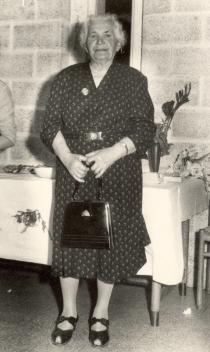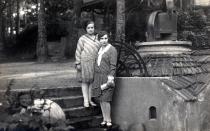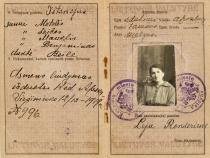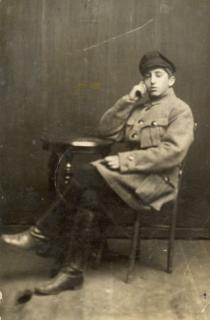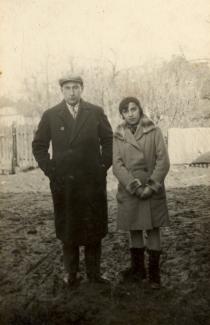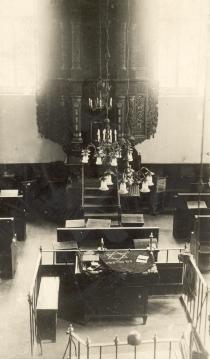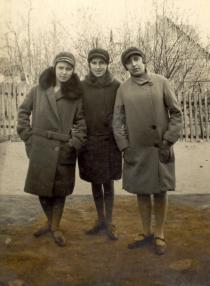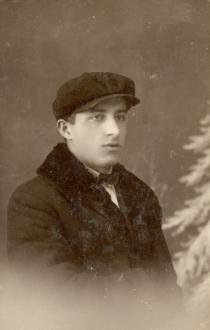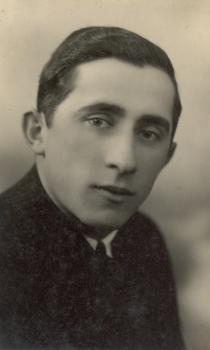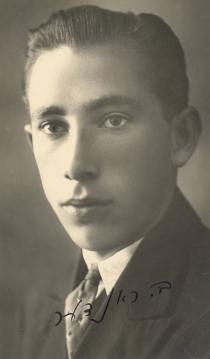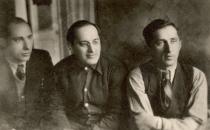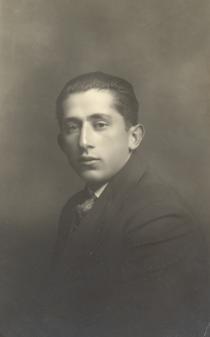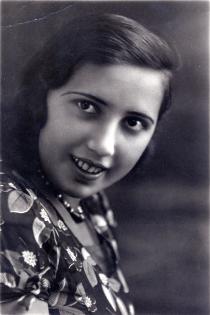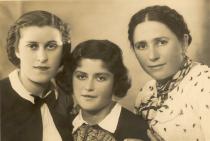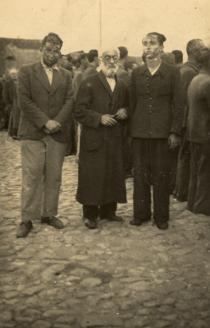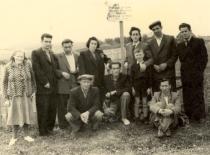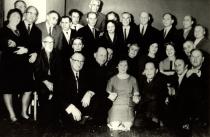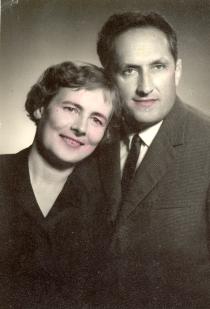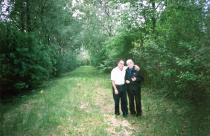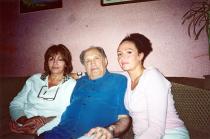
Judel Ronder
Kaunas
Lithuania
Interviewer: Zhanna Litinskaya
Date of interview: October 2005
Judel Ronder is living in one of the buildings constructed in soviet times in Kaunas. Judel instantly agreed for an interview in spite of feeling unwell. The door was open by a Lithuanian lady of the middle age. She said she was Judel’s custodian. He was sitting at the table. It was hard for him to get up. Judel was a tall, big man with nice facial features, sleek hair and sparkling eyes. When looking at him, it is hard to believe how old he is. Yudel starts his story. He is trying to tell as much as possible. His main storyline is about the people who perished in holocaust. No matter what he talked, he would always mention about the fate of the Jews during the war. First I was trying to make his story more customary course, but then I understood (and Judel confirmed it) that he was ‘afflicted’ holocaust, and I just listened to him closely. We were in a drawing room. We could hear that someone came in another room. It was Stepha’s daughter. When Stepha silently came in the room, it looked like she was aware of Yudel’s stories and she was worried about the fate of the Jews of her country.
I was born in Lithuanian town Kedainiai [about 100 km to the west from Vilnius]. In 1920s-1930s it was a small district town. The population was a little bit over three thousands, two thirds out of which were Jews. There were strong Jewish traditions in town.
I do not know much about my ancestors. My saw my maternal grandparents only once. It was during my childhood, when mother took her children to them. I was about 6-7. Grandfather Hirsh (his Jewish name was Tsvie) and grandmother Beila Bobtelski lived in a small town Naujamiestis [about 150 km to the west from Vilnius] not far from then German border. They were born in the middle of the 19th century. I do not know what grandfather did for a living, when he was young. When we came to see him, he was rather elderly and was not working. Grandmother was a housewife. They had their own one-storied house. We occupied one room when we came. We stayed there for about a week. I had not seen grandparents since then. I know that both of them died in early 1930s and without having lived to see the war, fortunately.
Mother had three sisters and a brother. Mother’s elder sister born in 1875, had Russian name Natalia. Probably she had another Jewish name, but I remembered the name she was called by her kin. Natalia was married to a Lithuanian Jew Frenkel. They left for South African in early 1920s. Natalia died 1970s. As it turned out we did not have anything to speak about as we had different lives and turned out to have nothing in.
My mother’s second sister Frieda, born in 1877, lived with her husband Meishe Markson in a small town on the North of Lithuania Pilviskei. Frida’s husband was a rich merchant. She sold poultry and horses to England and Germany. Frieda had many children: Channa, Yudel, Leiba and Leya. When the Soviets came to power 1, the whole family of Marksons was exiled in Siberia [Deportations from the Baltics] 2. Leiba, who was out of town, and little Leya, who was sheltered by the neighbors, stayed. The rest family members survived in Siberia and left for Israel in 1956 from Altai. Meishe died in Israel shortly after his arrival. He fell ill in Siberia. Frieda passed away shortly after him. Frida’s daughter Channa is currently living in Jerusalem, Israel. She got married with Friedman.
Mother younger sister Tsilya, born in the middle of the 1880s, got widowed young. When her husband died, she and her son David left for Palestine in early 1920s. She died in late 1940s, and her son David got a legal education and became a prosecutor. He is currently living in Israel. He has a large family –about 15 grandchildren and great grandchildren. We do not keep in touch as they do not speak Russian or Lithuanian, and I do not know Ivrit.
Mother’s brother Mordechai, born in 1890 was the youngest in the family. In 1920s he left for Palestine, wherefrom he went to England, where he graduated from London university. He found a good match for him, a Jewish lady Frieda who was in love with the science. They had been working together all life long. Mordechai, who was called Max, held lectures in London university. Both of them were constantly occupied with research, and they seemed to have no time for having children. Mordechai died in 1950s. Frieda survived him by ten years.
My mother Leya Bobtelskaya was born in 1879. In her birth record, issued by the rabbi, Sarah Leya was written. She was always called her second name Leya. Mother went to elementary school. She could speak and write in Russian, and she practically did not know Lithuanian. Mother said when she was wooed to Kedainiai Jew Wolf Ronder, before getting married she gave her the clew of tangle threads. According to the local Jewish tradition the bride was to unravel the threads which would infer that she was patient and hard working. Mother easily coped with the task. In actuality, further on she happened to be a good wife.
After getting married, mother moved to Kedainiai, where my father was living. I did not know paternal grandparents as they died long before I was born. I know that grandfather’s name was Menachem Rondem. I cannot recall grandmother’s name. Menachem was a gardener. He was especially good at cultivation of the cucumbers, which Kedainiai, took pride in. That business was taken over by children, my father in particular. Father had siblings and all I know about them is that they left for South Africa. I only knew about father’s elder brother Yudel. He was born in the early 1870s and died one year before I was born. I was named after him. I do not remember his wife either. She perished in ghetto. Yudel’s daughters Mina and Beile left for Palestine in 1934 with their numerous offspring. Mina had lived in Haifa all life long. She died in 1990. Beile remained single. She passed away in the 1980s. Yudel’s son Chaim Ronder was a close person for me. During occupation he managed to run away from ghetto and had been in hiding and he was by a hair’s breadth of death. In 1943 he happened to be in a partisan squad, which entered liberated Vilnius. Chaim died in couple of years after war. She was still very young. Yudel’s younger son Aba perished in ghetto.
My father Zeyev Wolf was born in 1875. I do not know where exactly he studied. I think he was literate. Father as well as grandfather cultivated cucumbers and sold them wholesale. I do not know for sure ho my parents met, but I think they had a prearranged marriage. In 1898 my parents got married in chuppah in the main synagogue of Kedainia. There were a lot of guests at the wedding, Jewish musicians. In word, it was a true Jewish wedding.
In a year, in 1899 my eldest brother Abel was born and in 1902 –David, in 1904 – Mordechai, in 1906 – Leibl, in 1910 – Menachem, in 1912 – Benjamin, and in 1914 – the only sister Beile.
In 1914 when the first world war was unleashed, the tsarist government exiled the Jews from the frontiers regions of Russian having considered Jews to be potential spies. Our family was to move to Kharkov [Ukraine, about 600 km from Kiev]. Father and elder brother were employed by tea factory. The factory was located out of town and father with his sons had to take a shuttle train. The train went past our house. At that time train speed was not high and usually on the way home father and brothers just jumped off the train being happy with making a beeline home. In 1919 the tribulation came to pass: as usual Dovid and father jumped off the train, but a handsome, 17-year old lad Dovid, fell under the train. Both of his legs were cut off. Fortunately, Dovid survived and even after his return in Lithuania in 1920 he got married and was happy in his own way. His wife Rivka, who came of a very poor family, married Dovid having deep affection towards him. She was not only a beauty, but she was also very kind and outgoing person. Besides, she was very intelligent. Dovid and Rivka had a son Volodya, who was a year and a half younger than me. He and I retreated together during the war. We were very close friends. Dovid and Rivka stayed in occupation and were killed in 1941.
In contrast to Dovid, the family life of my brother Avel was unhappy/ Shortly after his return to Kharkov Abel married Kedainia Jew Bune, who was very angry and feisty, who always threw him fits and even beat my brother. To please his temperamental wife and make money, Abel left for South Africa for seasonal work at plantation. My father went with him twice within four years. Both of them worked very hard and undermined their health. In 1930 Abel had appendicitis and was taken to the Jewish hospital in Kaunas, but it was too late and he died. He was buried in Jewish cemetery. Those were the first funeral that I remember. I took part in the mourning along with the adults. I was sitting in the torn (by the collar) attire. Bunya and Abel’s daughter Yudita moved to Kaunas and both of them perished in Kaunas ghetto.3
The third brother Morduchai finished lyceum. He married Jews Luba from Marijampole [Lithuania, about 100 km to the east from Vilnius]and moved to her. In his town Morduchai became a respectable man. He was the chief accountant at the mill. In 1941 Morduchai, his wife Luba and their baby David, were shot in Marijampole.
My adolescent brother Leibl left for Argentine to look for work. I remember him giving me a strong hug when saying good bye. This is all I remember about him. I had a bad toothache and I could not think of saying goodbye to my brother. At that time I did not understand what it was to say goodbye for good. At first Leibl wrote mournful letters, which made mother cry a lot. He wrote that he did not have a place to live, a thing to eat, and he remember tsimes mother used to make every Friday. He had to sleep in town garden of Buenos Aires. Then his things got better and Leibl found a job, married a Jew Adel from Byelorussia. They had a happy life together. Leibl’s son Kito is currently living in Israel and their daughter Channa recently died in Argentine. Leibl had a long life. He died in the middle of 1990s.
My favorite brother Menachem remained single and lived with us. He kept on working with father’s business- husbandry and sales of vegetables. He served in Lithuanian army. I have his picture in the uniform. Menachem was apolitical, he was fond of sports and he was a member of the Jewish sports organization Beitar 4. Menachem was shot by fascists in our town during the first days of war.
Benjamin, the youngest brother, was an underground komsomol member 5. When the Soviets came to power, Benjamin started working as an accountant in one of the soviet organizations. He married local Jew Miriam Ioffe. Miriam got pregnant before the outbreak of war. She and Benjamin were shot were shot during the first days of occupation in Kedainiai. along with other komsomol members.
My only sister Beila was beautiful. She got a good education – she graduated from Lithuanian lyceum. She was well educated and erudite. Beile married a rich Jew, grain trader Feivel Shishanskiy. I loved their little daughter Iona very much. I tendered her. Beila’s family was also shot by fascists during one of the first actions in Kedainiai.
I was born, when my parents were considered elderly. Father was about fifty and mother was in her late forties. By the time when I was born (17 March 1923) my father got very sick – he had open tuberculosis. When he was dying, father asked to wait before he died to name me after him as in accordance with the Jewish tradition I was supposed to be named after him, but I was circumcised on the 8th day and was given the name of my elder brother Yudel. The baby was to be named before brit-milah. In two weeks my father died.
The house, where I was born, was one-storied long building made by grandfather Leibl, which was practically out of town, close to the gardens. I vaguely remember that place. When the family was getting larger (practically all my brothers, beside my single brother Menachem, Leibl, who left for Argentine and Morduchai who left for Meriampol) brought their wives in our house. Then started having children, there was less and less room. Then mother sold the old house and bought another one in the downtown. It was kind of angular, two-winged, two storied wooden house like most Lithuanian houses. There were seven rooms, a large kitchen, where the whole family met at dinner in the evening.. Our family was neither rich nor poor. We had a modest living, but had all necessary things my mother and brothers worked very hard. They did not have easy bread. Мenachem dealt with husbandry more than anyone else in the family. In spite of the fact that he was not the oldest, he took over father’s business. Menachem treated me very well, trying to be like a father to me so that I would not feel like being an orphan. Even now I sincerely consider him to be my second father.
I do not know for sure at what time mother got up. At any rate it was long before the sunrise. She had to take are of livestock- chicken, turkeys, cows and horses. Besides, she took care of the husbandry. The family had equipage as well as dray horse. When I was a child, I got up very early, usually at 5-6 am and went in kitchen. By that time mother was by the stove baking bread and pies. Usually Yiddish was spoken at home. In the morning, mother used to speak Russian for me to have a good command of that language. She read me children’s verses about butterflies, moths and had me memorize them. The hardest thing was to feed me. I was a very feeble child. I most likely was afflicted with tuberculosis as later on the doctors found some lung scarring. Besides, I had constant toothaches. Thus, having meals was a real ordeal to me. Mother was running after me with a spoon of soup or porridge beseeching me to eat something and promising some presents for that. The only thing I was willing to eat were the cutlets made by mother. Then she found a funny way out- she paid me 10 cents for every plate of food I ate, but still it did not always work. I was such a poor eater that is hard for me to remember what my mother cooked every day. In summer Menachem hired some people to work in the garden as there was a lot to do. When I grew up, there was a job for me as well. I packed tomatoes for sale once, when there was a rich crop of cucumbers, mother asked me to sell some of them. I was standing on the road, heading to the town and sold cucumbers to the passersby and took 5 cents for one cupa (the container where 60 cucumbers could fit in). I turned out to be a bad salesman as cucumbers got rotten and I had to throw them away in the river.
It is hard to say how religious the family was when father was alive. When he died, mother was so busy with her chores that she probably had no time for praying. At any rate, at home she did not cover her head. I do not remember her praying. Sabbath was mark obligatorily. Usually mother went to the synagogue on Friday, having put a dressy outfit on and laced head cover. Brother and I also went there. In the evening mother lit candles. I still remember how she leaned over them and put her palms on he eyes. We had a festive dinner on Saturday- chicken stew, pies, sometimes gefilte fish. Mother tried not to do anything on Saturday. Usually some Polish lady worked. She also helped with gardening. But still, there were times when mother had to work on Saturday- to milk cows, feed poultry. Thus, she had to break Sabbath rules.
Jewish charity was very developed in town. We also helped the poor for them to have the chance to mark Sabbath. I remember that we had a very poor blacksmith, who had very many children. His wife was butter fingers and managed things poor. Apart from money, Rivka sent them basket with food every Friday.
Kashrut was observed at home. When I grew up, mother often sent me to shochet in synagogue. I liked watching him how he made a precision cut on the hen’s throat and hang it on the hook with a special funnel, wherefrom the blood was trickling down. The dentist prescribed me pork’s hat. I liked it a lot. Brother Menachem came to me and brought me a piece of pork fat telling me that it was important for me to eat it to be healthy. I ate it only when nobody was looking. Especially I did not want mother to see it. When I was a schoolboy, German Neiman rented some premises from us. He owned a store, where sausages and delicious ham was on offer. I was obsessed by the smell of that ham. The German guy must have felt it. Once when I came in his store, he started talking me into having a piece of ham. I was adamant saying that it was nonkosher. Then he put pork’s fat on my lips and pressed me against the wall. He was laughing at me being pleased with humiliating me. I did not say a word to my mother about that case. Since that time I had never stopped by that place. When in late 1930s, Hitler called all Germans upon returning to their motherland and all Germans from Baltic countries repatriated to Germany. Neiman also left.
We marked main Jewish holidays at home. I loved Rosh Hashanah, when the shofars were blown in the synagogues. At home we had a festive dinner.. On Yom Kippur we fasted obligatorily. I also fasted on that day, even when I was in the lines. I liked autumn holidays. Though we did not put sukkah in our yards, but I called on my Jewish friends and we had meals in the tabernacle. Simchat Torah was a joyful holiday. We ran to the synagogue to watch Jews dancing with the Torah scroll. I became rich on Chanukkah – mother and elder brothers gave money to me. I bought deserts with some of the money and shared them with my friends and nephews. On Chanukah we lit the candles on Chanukah- a silver candlestick. Each day we added a new candle. In accordance with the tradition, the chanukiah was placed on the windowsill and the whole city was shining with the lights. On that holiday children played with the spinning top and adults played cards. We ate tasty potato fritters. On Purim mother baked hamantashen and I took them to my school friends. They also brought presents- shelakhmones to me. On Pesach mother baked all kind of Jewish dishes- tsimes, sponge cake, chicken stew, gefilte fish. There was matzah at home. We ate no bread at that period of time. We got ready for the holiday beforehand making the house sparkling clean. I was given a task to whisk the eggs and sugar for the holiday cake. All siblings with their families came to us, but nobody carried out seder as neither father nor grandfather were a live, and brothers were modern people and they did not know how to do it and were not willing to. We did not disdain traditions. We loved our parents so we tried to please them and did what we were supposed to in accordance with the Jewish traditions. I do not know why I did not go through bar mitzvah.
My brothers’ favorite pastime was to keeping a diary. I found out about their diary, when I was a schoolboy. It turned out that mother and elder brothers described important dates for the family there. I read about my birthday there, about father’s death, about father’s request to hold on with my name. There was also the information about the birth of my nephew, Dovid’s son, who was named Volf after father [in Russian Volodya]. Volodya was my closest friend and.
Kedainiai of my childhood was a quiet Jewish town, where its inhabitants had a regular life. The only culprit was one Jewish drunkard Goldberg. He even at times was lying in the street and was taken home. When I grew up, I enjoyed going shopping with my friends and buy some small things there. There were tailors, cobblers, watch menders, glazer and other craftsmen. The richer people owned either brick or stone houses. I remember pediatrician Mulyar. He had two beautiful daughters, with whom I went to school on 28 August 1941. His whole family was shot by fascists during mass execution in Kedainiai. I remember an old lawyer Abramowitz, who loved children and treated them to deserts. During the occupation rabbi was smudged in tar and chicken feathers, taken out outside and teased, Almost all Kedainiai Jews who had not deported during the soviet times, were killed.
There were several schools in Kedainia, including Yiddish and Ivrit Jewish schools. When I was seven, I went to Ivrit 6-year school. My elder brothers insisted on that thinking that there I would get a more classic education. Before 14 I was a madcap and had did not think of studies. Having read the books by Sholom Aleichem 6 I decided to get the apples the way it was described in one of his stories. I made gadget looking like a rod a nail at thee end [I closely followed the instruction of the story written by Sholom Aleichem] and went to neighbor’s fence. Widow Schneider had an apple orchard and sold apples. Even in winter time she sat on the threshold of her house, having put warm coals under her skirt and sold the apples. I rooted under the fence with my rod and started getting the apples put in the piles. Suddenly someone snatched me. It was Schneider crying out loud. She pulled on my ear and took me home to my mother. I liked throwing stones at ‘alive targets’. Once I threw a stone at the chicken of my neighbor. She came to me that the chicken killed in non-kosher way could not be eaten. When something like that happened perturbed neighbors came up to mother and she only signed and covered their losses. My mommy never punished me. She understood that I was growing up without a father and she loved me very much.
In general, my school years fled very quickly. I had studied for six years in that school and I learnt Ivrit very well. I graduated from school in 1936. Our family had a pretty good relationship with the school principal Nisim Zaltsburg. Nisim was a friend of my brother Menachem and he decided to cram me for lyceum free of charge. In Keidanai there were no other educational institutions apart from Lithuanian lyceum and my mother did not want to hear anything about my going to any other city. I was very well crammed by Zalsburg and passed the exams preterm and entered the 3rd grade of Lithuanian lyceum. my favorite teacher Nisim Zaltsburg perished before a big action. He could not stand humiliation from the fascists and he hang himself in the room prior to execution of Kedainiai Jews.
When I began my studies at the lyceum, it seemed to me I was the unluckiest guy in the universe. At that time it was not a coed school. Girls were studying separately. There were 9 Jews out 32 students in the class. There was an ardent anti-Semitism, which was implicitly encouraged by teachers. We were teased, humiliated and even chastised. My classmate Gelsburg was so beaten that he had to keep to bed for two months. Nobody was punished, usually after such cases the principal said that all of us had to calm down without saying who was to be blamed. In late 1930s there was an anti-Semitism way in Polish and Lithuanian educational institutions. The Jews had to take separate desks, where they were supposed to be segregated from the rest. In some educational institutions certain students and administration were strongly against such discrimination. In our school there were some anti-Semitists who brought up the subject. During the Lithuanian lesson one of the Lithuanians got up and said «we, the Lithuanians, are not willing to sit with the kikes!» The teacher agreed with him. After such an offence, the Jews did not want to sit closely with anti-Semitists. We took the left side of the classroom. Then, one of the students, a Lithuanian Pole Katkyavichus, sat close to us without saying a word. I still remember that moment, the way I felt, my eyes streaming with tears from that warmth he demonstrated. I remembered that guy in my hardest days- when I was in the trenches. That reminiscence made me stronger. Katkyavichus remained in occupation, but he did not stigmatize himself with anything. After war he became the chairman of physical training committee. I met him often. We were friends.
. I was a very serious lad when I was in senior grades. I decided to get a good education, no matter what. I did pretty well. I started taking an interest in politics, listened to radio at home, I read newspapers. Of course, I knew what was going on in the world. I knew that fascists came to power in Germany and Spain, and what threat it was to the world. I was a member of Jewish youth organization A Shomer Azair 7. It was a left wing organization, getting ready the youth for immigration to Palestine, purchase of Jewish land plots, establishment of kibbutz. In general, the ideas of the organization were pretty close to communistic. I caught every piece of information about Soviet Union, thinking this country to be the domain of justice and happiness. My only dream was to leave for Spain, which was at war 8 or to go to Palestine, even if I had to walk there. I even started getting ready for the escape- bought a German backpack, stuffed it with rusks and sweets. Besides, I always replenished my stock of the rusks and sweets with the fresh ones. I also had geographic maps, torch and a Swiss knife. In a word, I took it very serious. If the Soviet had not come to power, I might have realized my dream.
I late June 1940 Soviet troops entered Lithuania 9. It was the happiest event in my life. Despite of not being a komsomol member, I was a stickler of communistic idea. I did not know what was going in the USSR, repressions 10, arrests of innocent people. When the Soviets came to power, I thought that the life would be amazingly splendid. My wise mother was very worried, she even cried saying that the land and the house might have been taken from us. I tried to calm her down and say that it was a mere trifle as compared to the fact that we would become free and equal. My pal – a komsomol member, and I went to Didzhuny on purpose as the units of Red army were positioned there and we were eager to see them. We worshiped those guys. Underground communists organized demonstration supporting the Soviets, who were met by the platoon of Lithuanian soldiers creating a mess. In general, the first days of the soviet regime were rather ardent and emotional.
Our life barely changed. Though, part of our land was nationalized, but we still had a small land plot. It was enough for our life, besides mother had some savings. The only relative of mine who was exiled was mother’s sister Frieda. As for the rest of us, we did were not affected by repressions. There was a school reform. In fall of 1940 our lyceum was made into the soviet school. Subjects were taught in Lithuanian, but our teachers remained the same. I was in high spirits, I felt inner freedom. I was not the member of komsomol, but I was friends with our komsomol leader Eisek Ioffe, who got me ready for joining komsomol organization.
On Saturday 21 June1941 we had a festive dinner at school, dedicated to the year end. The party was organized by military unit positioned in Kedainia. There was a concert of school choir. We danced, watched a movie about the life in USSR. It was a nice party. My comrade Morduchai Mulyar and I came back home at 2 am. On our way home we were singling a popular soviet song Favorite city can Sleep Quietly. Near Morduchai’s house we said: see you tomorrow, but the next day early in the morning we found out about attack of fascist Germany. I had never seen Morduchai again as he was shot during the first action.
My brother Menachem and Dovid in particular insisted on leaving the city and going to the East immediately. At that time our neighbor, my coeval Lithuanian Vitas threatened me with his feast crying out that soon I, comsomol kike would pay for everything. When the war was unleashed my mother was a rather elderly lady- she was over sixty. She had problems with the vessels on her legs and she could hardly walk. Mother, legless brother Dovid and his wife Rivka got on the cart. I, Menachem and Volodya, my nephew, followed the cart. People were walking on the road. There were people on the bikes and in the carts. All of them headed in the Eastern direction. Though, most of the Jews stayed in the city, having decided that Germans would do no harm like it happened during the first world war. Closer to the evening we reached the town of Sheta, the motherland of Rivka. Here her elderly parents were living. I had never seen such poverty in my life, such a wretched house. We spent a night there. There were other Jews from Kedainia who were heading to the east.
We could not fall asleep because of being alarmed. Dovid and Menachem had been discussing something all night long and at dawn they called Volodya and I. They started insisting that Volodya and I, the youngest, should leave the place immediately and go to Byelorussia by ourselves. Menachem could not leave the elderly people and Dovid, therefore they insisted that the younger ones should leave at once. Our conversation was heard by other young people and they also started packing. There were fifty of us. Some of us walked, others rode the bikes. We decided to take the road to Ukmerge. I was bellicose and dreamt of serving in Red Army. I even did not think of the fact that I was leaving my mother. I could not picture that I would never see her again. The brothers told me that we were not parting for a long time. Soon the fascists were to go back and we were supposed to come back soon and we’ll reunite with the family quickly. Rivka and mother found out about that and burst into tears. They did not want to let us go. Then Menachem took me aside and told not to pay attention to their rationale and to the tears of ‘silly women’. Menachem gave me his bike and wad of soviet money [I think there were 600 rubles]. Menachem took great Swiss watch Tisso from the pocket and gave it to me. He also put a waterproof cloak on me. Dovid also found as bike for Volodya and gave him money. Only later on I understood and appreciated what Menachem did. He understood that all of them were to die and did his best to save the lives of the youngest generation of the family- Volodya and I. My friend Aizek Ioffe also wanted to join us, but father did not let him go as he though that he had to share the fate of the whole family. The parents of the rest of the children did not let them go either. In general, there were the four of us who went together. I took my backpack, where I had rusks and toffees, flash light and the map of Lithuania. Mother only managed to kiss me and give me two cutlets. Those were the last mother’s cutlets I ate.
We took Ukmerte road. On our way we were stopped by the group of Lithuanians, who had become Hitler’s followers since the first days of war.. «Go where you came from, kikes!» - They were instructed not to let anyone pass. We took a minute to think and came back to Panevezhis crossroads. Not having reached it in the town Nigav, we called on an old poor Jew. He housed us in. early in the morning we hit the road. The host started asking us questions : what is going on, why are we running? – it turned out that he did not know anything about the war. We went to Panevezhis. Lithuanian ladies, who were working in the fields started throwing stones at us and saying– «Where are you running, kikes?» – We ignored them without looking up. In the morning of 24 June we came to Panevezhis. We heard the sounds of shooting and bombing. There were warehouses burning. We decided to go to the komsomol committee to ask for weapons and fight the fascist. In the building of the district komsomol committee people were fussy, running around with some papers. At first, nobody paid attention to us as there was a panic. Suddenly one man in the uniform ran up to me and arrested me. My pals were untouched. I looked like a saboteur paratrooper to him as I had a waterproof cloak and a German backpack on. Without saying a word they pushed me and took to NKVD office 11, which was located in red brick house. There was an officer sitting at desk in the office where I was taken. Judging by his shoulder straps he was a colonel. He took a pistol from the holster and put it on the desk. Interrogation started. I calmly said that I was a Jew, running away with my friends to the east to join the Red army. The colonel was not listening – «Why do you need the flash light, the map of Lithuania to signalize where the military positions are- you are a spy !».He asked for the convoy and told me to put my arms behind the back. When they walked me on the yard and could notice the body of shot tankmen. There were about six or seven Lithuanians in the basemen. Lithuanians told each other about their feats- one of them boasted of killing the tankman with a knife. I felt terrible as I understood that it was a criminal gang. I understood that nobody would look into my issue and I understood that I would be executed with those criminals. I remembered the movie called we are from Kronstadt, where the sailor tore his singlet before executing. I decided that when I would be taken out for the execution, I would sing International [Anthem of the International Worker’s Movement and of the Soviet Union between 1918 and 1943. Originally French it has been translated to most languages and has been widely used and is still used by various Socialist and Communist movements world wide.] to prove that I was not an enemy. Soon I was taken out of the basement. Hardly had I started singing saw I my pals standing by NKVD lieutenant and pointing at me. The lieutenant came up to me and asked me in Yiddish who I was. Then Volodya turned up and said that I was his uncle. Thus, I did not have to sing International as they let me go. Even now I remember about that case with humor despite of being about to die.
We went to the train station- the echelon with the fugitives was about formed at that time. We took the locomotive train. At night we headed to the east. There was such a bombing on our way that one lady ran amuck. We witnessed her hysteric laughter. Somewhere in Byelorussia, the train was stopped and all civilians were told to get off the train. That was a spy mania at that time as they were afraid that the agents might cross the border along with the fugitives. We walked along the ties and happened to be in Latvia again. We spent a might in the house of the Russians and were given there a very warm welcome. In the morning we tried to cross the border for several times. Frontier officers were in ambush behind the bushes and did not let the people cross the border. Finally we found a loophole and happened to be in Byelorussia once again. We had walked for several kilometers and stopped by the administration of some kolkhoz 12 to slake thirst and to ask for food. My mother’s cutlets and sweets from my backpack were eaten a while ago. The administration gave us water and during our respite they called the frontier officers. Again we looked suspicious. My pals tried to talk me into getting rid of my backpack, but I said I would not it in any way. We had to lean against the wall with our hands raised right in front of Stalin’s portrait. We were checked and released. We had to walk again. I do not know how long we went on foot that our legs got swollen. So we walked barefoot. We slept straight in the field. Thus we reached Nevel, which is to the North from Minsk. There was a locomotive train at the station. There were big stones on one of the platforms. A wounded pilot, and several officers were lying on those stones. We asked them to go with them having explained that we were the fugitives from Lithuania. The guys helped us climb on those stones and we headed farther. On our way we plucked some grass and put in on the stones. It was a tiring trip. Besides, we were starving. In a while we started having lice, which always appeared in war and devastation I rolled my pants and was shocked to see that my boots were teeming with lice.
Thus we reached Sverdlovsk [about 1000 km to the North East from Moscow]. There was an evacuation point straight at the train station. We had to go through disinfection right away. I was ashamed to take my clothes off in the presence of the nurses’ aides – ladies. They were not looking at us as they were used to their work. When I was taking a warm shower, I saw that my whole body was I red bits from lice. After sanitation we were given food to eat. We started brooding on next steps. It did not take us long as the so called ‘recruiters’ came. They hired young and healthy people for work. When they saw the four of us- young and healthy all of them started talking us into working for them. Volodya and I agreed to work in one of the coal mines of the region. Here we parted with our fellow travelers and we had no idea what happened to them later.
Our passports had been taken right away and we went far in taiga. We had covered about 180 kilometers of God forsaken woods and arrived at local hamlet. We were housed in the hostel and the next day we went to the mine. It was a new mine and every day we had to dig about 6 deep pits. The waters were dripping behind the collar making it really cold. I had never worked so hard in my life. In the morning we had warm porridge without butter and then we had to toil all day long. There were a lot of drunkards in the village. Everyday the men were drafted in the army, so vodka and moon shine were gone. There was even no eau-de-Cologne from the local store. We also went to the military enlistment office, but Lithuanian people had not been drafted yet as there was no trust in them at that time. There at the mine we made friends with young man Kopelev and he decided to help with the transfer for timber cutting. We took us in his place. His mother, a kind Russian woman, gave us some food and tried to convince us that we should leave this place as we would not survive the winter here. She advised that we should go to HR department and take our passports back. It took us a long time to convince our boss. I said that I wanted to study and Volodya said that he had a heart trouble ( it was the truth). The HR manager was sorry for us and he gave us our passports back.
We took the train and headed to the South. I had spent for several days at the train station in Chelyabinks, wherefrom we left for Aktyubinsk. Finally we happened to be in Tashkent [now the capital of Uzbekistan, about 3500 km to the South East from Moscow]. We had spent several days at the train station and then left for a calm city Ferganu, located one kilometer away from Tashkent. We found a job, washed lemonade bottles. In the afternoon we had tea with rusks in the café as we could not afford anything else. We spent the night on the bench in the central park. Fall came and the nights were getting colder. We decided to look for the job offers with lodging. We turned out to be in kolkhoz 17 party congress. We were housed in covered wagon. All we had inside were quilts. We worked in the field harvesting cotton. The day norm was unachievable for us hungry people and we put the stones in the harvested cotton. Before going to work in the morning we ate the onion as there was a lot of it and had water from the dirty canal along the street. Some locals were sorry for us and gave us some food, others teased us. I remember, one time a rich man was riding a donkey and eating dried apricot and we followed him and picked up the pits. I do not know how we would survive the winter in the poor kolkhoz, but we were lucky to be demobilized in the army in December 1941. We were sent in Balakhna, Gorky oblast, where the 16th Lithuanian division 13.
I turned out to be in Balakhna in February 1942 and had stayed there for a year with the training unit. It was a joyful time as I was with my comrades- the people I knew. We were not starving. If there was not enough to eat, we exchanged the remainder of our civil things for food. Volodya, my nephew, played the violin and was assigned in Lithuanian military orchestra right away. It was formed in Pereyaslav Zalesskiy. We corresponded with him and I was looking forward to Volodya’s letters as he had become one of my closest friends by that time. Here I also met Mendel, my pal from Kedainai. He came of very poor family.
I became a combat engineer and happened to be on the leading in late February 1943. In spite of annual training, the first battle was very hard on us. We were in action on 23 February 1943 in the vicinity of Alexeyevka of Orlov oblast. The winter was very cold and snowy. Hardly had we cleared the way before the attack when it snowed again. I heard Mendel’s voice calling me in Jewish –Yudus- today is a big battle and we will win. It was his first and last battle. Mendel perished. Artillery was lacking behind and there was no training. I was lightly wounded on the first day. Fortunately it was not serious. The bullet was caught in the jersey and my hand was just slightly touched. They rendered me the first aid. The commander told me to go in headquarters, located in Novoalexeyevka, report on the status and take a rest. I could hardly move in the store, supporting my wounded hand, but I managed to reach the headquarters. When I reached the headquarters dug-out, I was about to swoon from the smell of food. The officers were sitting at the table and a young lady served just baked pancakes. I off the gasket and said while we were fighting, they enjoyed themselves. The officers calmed me down, gave me some pancakes and took to the village hut. I spent the night on soft hay in the garret and in the morning came back to my unit. In March Novoalexeyevka battles were over and were taken to the rear for reformation. By the way, there were other human feelings, including the comic ones apart from deaths and horror. I remember how we could not stand break-up spring season, when our legs were drenched. One of the old-stagers- the sergeant, advised to put gas masks instead of galoshes. Thus we followed his advise. The general from headquarters was passing by. When he saw us he commanded right away: «Attention, gases»», and we were supposed to put the gas mask on right away. We were reprimanded by our squad commander for inappropriate usage of gas masks
In June 1943 I got the letter from Volodya, where he informed of his arrival in the unit. I got ready for our meeting beforehand. I stashed the bread from my ration as I knew that musicians got much poorer nutrition that we. It is hard to put in words what it felt like when we met. Both of us were happy and sad at a time. We cried over all` tribulation as we understood that our relatives who stayed in Lithuania, perished. Before leaving, Volodya gave me his picture where he wrote in Yiddish: revenge on fascist occupants for our mothers’ deaths.
After my meeting with Volodya, our unit was transferred to the areas of Orel and Belgorod, where one of the most important battles of World War Two was being prepared. Our unit was dislocated in Kamenka village. I was included in the combat engineering intelligence group. We were to observe what changes were taking place in German units. My workmate was Lithuanian, who came of Caucasus. His name was Domark. Usually at night we approached German defense trenches. We hid in small pits which we dug out. Once I probed something hard with my digging tool. When I unburied the object, I found out that it was a hand. It belonged to the soviet solider judging by the color of the military jacket.
We observed the movement of the units, watched whether there appeared more technical equipment and tanks, and sent the messages in the headquarters. Once I saw 50 Germans marching and we started artillery shooting on command. There was time when I killed a high rank officer from my rifle when he popped out from the trench. It was easy for me to fight and I always remembered the death of my relatives and all Lithuanian Jews, so I decided to take revenge. On that day German command started their propaganda all of a sudden. By the trenches we could hear transmissions on German radio calling Soviet soldiers and officers to surrender for great well-being, well paid job and good life in Germany. Of course, we did not believe in that. Fascists threatened that there would be a major attack on 5 July and told to prod the bayonet in the earthy which would be the signal of surrender. There was propaganda on our side as well and during the breaks soviet songs were sung and fascists also enjoyed them. Domark, my workmate was anti-soviet. He dreamed of surrender and tried talking me into that. He said that he would not give away my Jewish origin though I understood that he would do it in a heartbeat. I indignantly refused and it was hard for me to stay close with the potential traitor. We parted after the first battle. As far as I know Domark died in 1944.
Once we were given a warning of the next attack. Late in the evening on 4 July Domark and I left for another task. I remember my compatriot, the Jew from Vilnius, the military doctor Dashevskiy, said good bye to me. he wished me good luck in the coming hard battle. He said he was not sure whether I would see Lithuania once again, and added that he was sure to see it. There was a bombing early in the morning and it also affected us. There were great many tanks after that. There was a fierce battle. As a result our unit was besieged. We got out of the siege in the evening. We literally were stepping at cadavers of our soldiers while walking back to our positions. When we came, Kamenka was on fire. It turned out that captain Dashevskiy and Lithuanian nurse died from the direct bomb hit. That was the war … nobody could know what would happen next minute.
I could talk about war incessantly if it had not been so painful to recall about the perished. When Orlovka battles were over, our unit was to be reorganized. We were sent to the just liberated Byelorussia, Vitebsk. I was a sergeant. Our squad was given assignment to build the bridge across Yemenka river within one night. It was a very urgent and important task. The bridge was meant for our troops to pass. We started working despite of shooting and by the morning the half of the squad had been dead. The bridge had been construction within the timeframe. At that time my friend, a Lithuanian of my age Gelaytis, died in my presence. When dying he said: «tell mother…» After war I could not find his mother. She died, but I told his sister how he died. We took the bodies to our side of the river and buried them. After war they were reburied in village Plestsi in military cemetery, where the monument was set up in their honor.
After Vitebsk we happened to be in the vicinity of Polotsk. I and two more of the girls from my department were assigned to the battalion named after Lithuanian Soviet Union Hero 14 Wolf Vilenskiy. Once he saved my life by killing the fascist who was aiming at me during our attack accompanied by «Hurrah!». In summer 1944 before the attack I wrote the announcement to join communist party and became a communist.
On 10 July 1944 there was a case which I am still dreaded by. I captured a fascist. He was a guy of my age, wearing a helmet and a mosquito net. I commanded him to drop weapon and lied down. I lied down close to him. Our conversation was short, but I will always remember it. I asked where he was from. He told me about his birthplace and added that only today their unit came to the front from Dantsig. He had never been to war before that and had never killed a man. He was awaiting death and was very scared. He put his hand on my gun beseeching me to spare his life. He even showed me his mother’s picture. I told him : «Don’t be afraid, though people like you killed my mother, but I will spare you- Jews and communists do not kill captives!» At that moment his arm was being touched by the accidental bullet. I put a bandage and repeated once again that Jews and communists were not killing the captives. Then the officer from the headquarters came to get the captives and that lad was taken away. I had never seen him again. I had speculated on that case for long. I thought that I had no right to play the master of human life, even when it goes about your enemy. It is wrong to kill eth helpless. After war I told that story to other Jews. I even had quarreled with my cousin Chaim for a long time as he argued with me through his hatred to all the Germans as he barely survived the occupation. Chaim cried out that I ought to have killed the fascist and had not right to spare his life. I asserted that if I knew that he was involved in executions and other wrong-doings, I would kill him, but that person was a mere victim of Hilter’s fanatics. I had been pondering over and over whether I was right or wrong. Many years had passed and Chaim died. I wrote the article in Russian paper in Berlin, where I described my case. In about two months I got the letter from the editor’s office. It was the German lady, who happened to be that guy’s mother. She said that her son was in Soviet captivity and came back home in 1947.He kept on telling everybody who a Jew spared his life and put a bandage on his hand. In 1954 he died from meningitis. The lady invited me for a visit. I responded to her with the polite letter and made sure that my deed was human.
The next day after that case I was wounded and was taken to the hospital in Vitebsk oblast. I was contused being almost blind and my hand was wounded. I found out about liberation of Vilnius from my letter. I had a gangrene and the Jewish doctor Krivorushko wanted to amputate my finger. I wanted to go in battle. I tried talking her into leaving my finger as I wanted to be in action. Thus, she managed to save my hand. I was hurrying home and the doctor told me: «Why hurrying as you would not find anybody at home!». The nurse wrote the request in Lithuania and I got the letter where I found the truth about my family’s perishing. Only my cousin Chaim Ronder survived and was living in Lithuanian city Pagede.
From hospital I was sent to 27 division in Latvia. I did not want to be a combat engineer and ask to transfer me in any other unit. I became a gun soldier after couple of hours of training. I was in action in Latvia for a while and then happened to be in Ukraine. I took part in liberation of Moldavia and Romania. I marked the victory day in Romania in the palace of the kind Michai the 2, where we had our quarters. I even spoke to the king’s grandmother. She kindly treated soviet soldiers. I had stayed in the army until November 1945. I got several awards - Great Patriotic War Orders of the 1st and the 2nd class 15, Red Star Order 16, two medals for «Valor» 17, medals and orders for liberation of the cities. In fall 1945 there was an order on demobilization of those who were wounded more than three times. I was classified for that. I was given a free train ticket and a ration. They asked me where I was heading. I named the most Northern city of Lithuania –Mazheike having decided that I can get off the train where I wanted on my way. I knew that my nephew Volodya was living in Vilnius. He was demobilized from the army. Chaim Ronder was living in Pagedai.
I got off the train in Vilnius. I had mixed emotions. I was happy to be in the motherland, though understanding that I was alone. I spent couple of nights in the house of some of Volodya’s distant relatives as he was out of town at that moment. I decided to go farther. I went to Pagedai,where Chaim Ronder and his wife were living. I was given a very warm welcome. We had talked with Chaim all night through. He told me how my family perished. Now I found out horrible details. When on 23 June 1941 Volodya and I left for the East, my mother could not calm down. In couple of days fascists came and put all the Jews in large stables. There were kept there for several days, even were given food and promised to be taken to work somewhere. Mother said with tears : «Why did I let my favorite Yudel go, he must have been lying dead in some ditch». In several days all Jews were taken to execution and my mother, whose legs were very sore, was buried alive straight in the yard of the stables. My poor mommy did not know that her Yudele survived and was one of the very few Kedainiai Jews who visited her grave [editor’s note:after those words Yudel burst into tears and could not stop crying for a while].
Chaim managed to escape. He was hiding in the forest, dug pits, where he sheltered himself. Some Lithuanians helped him and gave him sconce. He was about to face death for several times. Once the warden of the village so a lady brining food to Chaim and he gave him away. The found a pit where brother was hiding and encircled it. Policemen could not lure Chaim from his sconce and had been calling him kike for a long time. Chaim outsmarted them. he got out of the pit and blew politseiz up with the grenades he had. He rushed to the farmstead of the peasant Vishotskiy, who had helped the brother on a number of times. Brother was running barefoot on the snow. Visotskiy hid him in the stove. When he took a rest for a bit and looked around, he saw that the walls of his hut were covered with Torah readings. Chaim got off the stove and said that he should flee right away. He left at night and roamed for long. Visotskiy was a good man and he probably was not aware what his walls were covered with. The next time my cousin had to spend the night in Visotskiy ‘s place, he had white wall papers. Lithuanian understood that he insulted national Chaim’s national feelings. Chaim had been a partisan for a long time, took part in liberation of Vilnius. Then he worked in Kedainai militia. Then he was transferred to Pagedai.
Chaim married a wonderful lady. Sarah was married to our agnate double cousin David Gronberg. David perished and Sarah had to see inferno in occupation being in concentration camp. According to Jewish tradition Chaim married her. It was a great, kind family, where I found my home. Soon I found a job at district authorities, but got into trouble as one Jew wrote a letter saying that my parents were rich. So, I was fired. In a while, they thought batter and I was reemployed. Those were hard times – we founded kolkhozes, fought with Lithuanian gangs, who had left for the woods. I do not want to talk about that. Now the values have changed in Lithuania. I do not want my neighbors to know that I fought with the ‘patriots’. I went from village to village being authorized to found kolkhozes. The chairmen of rural councils helped me a lot. There were traitors among them. It was the time when I got the notes with the threats to lose my life. I never said in which house I stopped. I always had a pistol with me. Chaim gave it to me. I had to run away in the woods and fight with the gangs. This is all I can in regard to your question.
Chaim and I were best friends. Though, he had frazzled nerves and could not get rid of the recollections about war. At that time German captives could be seen on the roads, in towns. Once a German lady knocked on our door. She asked for food and Sarah gave her a piece of bread. Chaim was perturbed, turned that lady out and even hit her. I understood Chaim, but did not justify his actions in such cases.
I had stayed with brother’s family until 1949. Chaim and his wife moved to Kaunas, but I stayed in Pagedai. By that time I met a young Lithuanian, who was a member of former underground comsomol. We had a lot in common. We got married 1948 and the same year our daughter was born and named after my mother Liya. My wife’s name was Meybute Tamuinene (she kept her maiden name). She was born in Pagedai in 1925. She also worked for municipal authorities. My wife’s father was a communist. He was a communist, very good-natured and mature man. He treated me very well. Later on I was sorry for not having married a Jew. My wife was not anti-Semitism, but she never understood the depth of my feelings for Israel, my willingness for repatriation. It was most unpleasant for me that Meybute was an ardent stickler of Stalin and took his death as if` he was her father. In a while we started being more and more aloof, but I did not divorce my wife because of our daughter.
In late 1949 I left Kaunas and my wife and daughter stayed in Pagedai. We still were not divorced and I considered myself to be a married man. We were just separated. In Kaunas I was immediately employed for the position of the assistant to the chairman of the municipal authorities. Then I was transferred to the position of a legal advisor. I did not have a problem with employment. It was enough to come to HR department in military jacket with the awards. I never wash it and keep all awards on it. Besides, it was the time when they needed literate employees, who are fluent in Lithuanian and Russian. In a while, my wife and daughter came to me and I was given an apartment. I have been living in Kaunas since then.
I should say that state anti-Semitist campaign, deployed in late 1940s [Campaign against ‘cosmopolitans’] 17 and in early 1950s [Doctors’ Plot] 18 was not as active in Lithuania as in any other part of Russia. I was not affected by it in any way. Of course, it was repulsive to read and listen to about doctors poisoners and I took it hard. I was glad when Stalin died. I thought him to be a tyrant at that time. My attitude to Stalin added up antagonism in the relationship with my wife.
In 1953 I quitted my work in municipal authorities and was employed as HR manager at the factory. I entered extramural legal department of Vilnius university. I went to Vilnius several times a year. My trouble started at that time. I did not keep Jewish traditions and marked no holidays, but I never forgot that I was a Jew. I met other survived Lithuanian Jews and we went to the places of execution and collected donations for the monuments in their honor. My idea was to make a so-called archive of the people who rescued Jews and those who murdered them. I have been doing it from the moment of my return in Lithuania and until now. Probably my peculiar hobby was found out by security and I was called in KGB, interrogated and threatened. There was no imputation for me as I did well, was the member of party and my reputation was not marred.
In 1959 I went to Vilnius to another semester of the graduate year. I was supposed to write a diploma paper. It was the period of centennial jubilee of Sholom Aleichem and there was a postal stamp was dedicated to that even. I went to the post office to buy it. A lady who was in front of me in the line caught my attention. She was a well-dressed Jew. She did not look like a local. She spoke neither Russian nor Lithuanian to explain how many stamps she would like to get. I started speaking Yiddish to her and found out that she was born in Kaunas and currently living in Israel. She came to Lithuania from Moscow, where her husband Eliva was working as the second secretary of the Israeli consul. I enjoyed talking to her an she invited me to the hotel. I came there, but I did not go in the room. I asked Israeli lady for some souvenir from her country as it was sacred for me. The lady came down in the lobby with Israeli newspaper and gave it to me. We talked a little bit. We mostly spoke of Israel. After that we said good bye to each other and I went to the train station. Two men of mediocre appearance came up to me and pushed me in the car. I was taken in Vilnius committee of national security. I had been interrogated all night long asking me what information I gave to the Israeli woman, blaming me in the treason, threatening with arrest and trial. They took the paper that the lady gave to me. I still surprised how I was not arrested. Those were different times- if Stalin was alive, I would be in the camp for that. They let me go in the morning. When I came in Kaunas, I was not admitted to work. They had all the information here and I was found. In couple of days I was expelled from the communist party for loosened party vigil. I was shocked. Of course I was hurt for being expelled from the party, but the worst thing was that I was jobless and unable to provide for my family. I decided that I should write my diploma paper and graduate from the university. When I was defending my diploma, there was a person who started asking questions for me to flunk, but still I succeeded. I came back in Kaunas and started looking for a job.
Having wasted couple of months for my futile efforts to find a job, I wrote a letter to the first secretary of` the central committee of the party. I wrote that that I graduated from legal department of the university and could not find a job. I also wrote if he did not help me get a job, I would have to take a poster: a soviet lawyer is looking for a job of a janitor- and walk along Laivess alley (then Stalin street). In a while I was called by the municipal authorities and offered a job of a lawyer in a small shoe factory. I had worked there until retirement. When in 1975 I came to Israel for the first time, the lady which brought trouble on me, came in my hotel. Somehow she found out from her Lithuanian friend which problems I had and also learnt about my visit. Israeli women brought a huge boquete of roses. Then she invited me to call on their family. I met with her husband, a famous polititian at that time.
I did not have to deal with KGB any more after than. My last call there was in late 1950s. My cousin Chaim and his wife were going to leave for Israel via Poland. My cousin was very nervous as it was pretty problematic at that time. Ten days before departure Chaim had infarction and died. He was buried in Kaunas and I personally designed his tombstone. There was a Mogen David on it. In a while I was called in KGB and asked who instructed to put Zionistic symbol on it. I said it was my idea and I would not let it removed from my cousin’s grave.
In 1960s I was fond of amateur art. There was a Jewish amateur theatre in Kaunas, which was about the only one in the USSR. We staged the plays of Sholom Aleichem, learnt and sang Jewish songs. In 1963 we gave a large concert devoted to the 20 year anniversary of the mass execution of Kaunas ghetto Jews. After that active members of that theatre were called in KGB and threatened that it would be closed down and repressed. I did not fear anything. It must have been hard to make me submissive.
In 1975 I filed my documents for the trip to Israel. At that time to go there it was necessary to get the letter of invitation from a close relative. I did not have such. With the help of my friends I got the invitation from my sister Beila who allegedly was living in Israel. My poor sister who is in the common grave with her little daughter Iona, did me the last favor. When I submitted the documents, I was called at a certain point They said they would never let me out. Strange as it may be in a while I was issued a visa either it was because of somebody’s help or they just decided to watch me. Though, my wife was in the way thinking that I would not come back to her. After having received the visa, some Kaunas Jews stopped keeping in touch with me thinking me to be an informer. One of them even wrote a letter to his friend in Israel for them to beware me. The Israeli guy, who knew me perfectly did not believe it, laugher over that letter and even showed it to me. Israel was my revelation and joy. I could not help breathing in the air of Israeli state. I met some of my distant relatives and the most important thing I saw my cousin Volodya. He married a Jew from Ukraine shortly after war. He had two sons. Unfortunately, my brother had heart trouble. It was our first and the last meeting after war. In 1976 Volodya died at the age of 51. I went to Israel three more times, two of them during the soviet times and one time 1990s.
I always dreamed of immigration to Israel, but my wife was against it and I did not want to leave my daughter. My wife died in 1989. I did not marry again. It was too late for me to leave for Israel at my elderly age. My daughter Liya identifies herself as Jew and at the age of 16 she put Jewish nationality in her passport. Liya tried entering teachers’ training university for several times and failed to it. She did not have a higher education. Liya’s personal life was not happy. She was married for couple of times. Every time she married non-Jews and I was not pleased with that. Liya has my last name Ronder. To my shame she left Germany in the 1990s which was not acceptable to me. I refused to visit her. I think that after holocaust Jews cannot have anything in common with Germans, and have their sops. Liya has two children- the elder –Dovid, born in 1976, named after my brother. He is dreaming to go to Israel with me. My granddaughter Etel, born in 1981, is studying at the university.
When I retired I had worked for couple of years for Vilnius Jewish museum. By that time I had collected a pretty considerable material about holocaust in Lithuania, about the murderers and the rescuers. And helped many of them get the title Righteous among the Nations 20. I always kept an active civil position in this matter. I always was an ardent struggler against anti-Semitism. A few years ago a Jewish cemetery was raided- the gangsters upturned the graves to find some gold, including golden teeth. Chaim’s grave was also touched. I filed a suit with the court to get spiritual injury compensation in the amount of 1 lita. This case was covered in papers, but it was not sustained as they alluded to absence of such law on spiritual injury compensation.
Several years ago I found out that one of the murderers of the Jews lives nearby. He is healthy and wealthy. I was aware of his testimony at one of the postwar trials, when they could not prove his participation in the actions and executions. Then I started writing letters to the murders for them not to sleep quietly. Once I wrote a letter to the man, where I describe his and others malefaction in detail. The letter was written by the daughter, who loved father very much and asked him to say if it was true. Father said that he was a good man, and the letter was tosh and even tried to turn it into a joke. The lady did not calm down and went to KGB. She asked for the truth. They did not tell her anything as his guilt was not proved. When she came home she found him dead. He hung himself in the bathroom. I do not have any compunction as I think it was a fair punishment for his crimes.
The global community supports me. I have a sponsors, who assists Lithuanian righteous among nations. His parents got rescued and lived for Switzerland. He is currently living in the USA. He invited me there and I accepted his invitation. I was in the States for couple of times several years ago. I gave my documents – the list of murderers and the list of rescuers of Jews – to the Museum of holocaust in Washington. Thus, I completed my mission in the world.
Now I am living in the independent state [Reestablishment of the Lithuanian Republic] 21. Of course, it became easier for the Jews to live when they did not have to conceal their nationality, but still anti-Semitism is still there, and when it is discrete it is much more dangerous than open. I am an old and a sick person. I demised my apartment to the Lithuanian lady Stepha. She is the daughter to one of the righteous among nations, whom I helped quite a lot. Stepha is a wonderful lady. She became my custodian and looks after me as my own daughter. We often talk and she is always surprised at my ardent hatred to the fascists, Germany and some Lithuanians. Then I ask her if someone killed groundlessly killed her relatives, buried her mother alive, she sits pensively and does not say anything as she loves her family dearly.
GLOSSARY:
